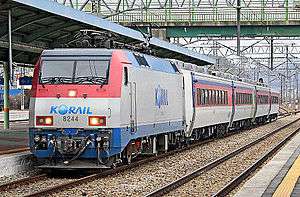Mugunghwa-ho
The Mugunghwa-ho is a class of train operated by Korail, main railway operator of South Korea. In 1980, new express train, named 우등 (Udeung, literally meaning Premium), was introduced. Soon it was renamed as Mugunghwa-ho, which was a name of an express train operated in the 1960s. Since train classes below Mugunghwa had been retired, thus Mugunghwa trains are now the cheapest class of trains to operate cross-country. Along rural lines such as the Gyeongbuk Line, they remain the only class of passenger train operating. They (and in some cases the Tonggeun) are the only trains to stop at many stations not served by Saemaeul-ho or KTX trains. Mugunghwa are built to accommodate large numbers of standing passengers, and frequently have many more standees than sitting passengers.
| Mugunghwa-ho | |
|---|---|
 Chungbuk Line Mugunghwa-ho train. | |
| Overview | |
| Service type | Regional rail |
| Status | Operating |
| Locale | South Korea |
| First service | January 1, 1984 |
| Current operator(s) | Korail |
| On-board services | |
| Seating arrangements | First Class (1+2) Standard Class (2+2)[1] |
| Catering facilities | On board cafe |
| Technical | |
| Rolling stock |
|
| Track gauge | 1,435 mm (4 ft 8 1⁄2 in) standard gauge |
| Mugunghwa-ho | |
| Hangul | |
|---|---|
| Hanja | |
| Revised Romanization | Mugunghwaho |
| McCune–Reischauer | Mugunghwaho |
The Mugunghwa-ho takes its name from the hibiscus syriacus, the national flower of South Korea.
Materials
- Passenger Car: There are various types of passenger cars, and the below are still operating in 2010s.
- Long-length Mugunghwa-ho Passenger Car
- Streamlined Mugunghwa-ho Passenger Car
- Multiple Units
- Refurbished Diesel Car (RDC): Former Commuter Diesel Car (CDC)
- New Diesel Car (Retired in 2010)
- Diesel Excellent Car (Retired in 2001)
Accidents
- On March 28, 1993, a Mugunghwa-ho train in the vicinity of Gupo Station in Busan rolled over due to land depression under a section of track caused by nearby construction. Seventy-eight people were killed and another 198 injured, making it the worst rail accident in South Korea.
- On April 22, 2016, a Mugunghwa-ho 9-car train which departed Yongsan Station at around 10:45 p.m, and headed for Yeosu Expo Station on the Jeolla Line, was derailed at 3:41 a.m on a curved track intersection while approaching Yulchon Station. 5 out of 9 cars were derailed, and 2 toppled down, damaging parts of the railway electrification system. The engine car toppled away from the tracks, one engine driver was killed, 7 passengers were injured and a secondary engine driver was injured. 23 people were known to be onboard the train. Upon derailment, it is known that the train crashed into an unknown object. According to Korail engineers, the locomotive was operating at 127 km/h on the curved railway intersection. As the train was approaching a platform, it was designated to operate under 50 km/h when approaching stations. After further analysis on the train's data and voice recorders, the accident seemed to be occurred by the engine driver. Legal measures are to be taken on the two engine drivers. The remaining four cars were moved away from the tracks, and the destroyed rail electrification pylons were recovered in 25 hours.[2]
Services
Since retirements of Tongil-ho and Bidulgi-ho, some of those trains are upgraded to Mugunghwa-ho trains, although they rather stop more stations. Although some of stations are closed from the retirements, stops of Mugunghwa-ho are varies for each train. List below are lines with regular Mugunghwa-ho trains:
- Gyeongbu Line: Seoul Station–Busan Station/Dongdaegu Station/Sinhaeundae Station
- Janghang Line: Yongsan Station–Sinchang Station/Iksan Station (via Hongseong)
- Chungbuk Line: Seoul Station/Daejeon Station–Jecheon Station
- Honam Line: Yongsan Station–Gwangju Station/Mokpo Station
- Jeolla Line: Yongsan Station/Iksan Station–Yeosu Expo Station
- Gyeongbuk Line: Yeongju Station–Busan Station (via Sangju)
- Jungang Line: Cheongnyangni Station–Andong Station/Dongdaegu Station/Bujeon Station (Korail) (via Yeongju Station)
- Taebaek Line: Cheongnyangni Station/Jecheon Station–Jeongdongjin Station (via Taebaek Station)
- Yeongdong Line: Dongdaegu Station–Gangneung Station (via Bonghwa Station)
- Daegu Line & Donghae Line: Dongdaegu Station–Pohang Station/Bujeon Station (Korail), Pohang Station–Bujeon Station (Korail)
- Gyeongjeon Line: Gwangju Station/Mokpo Station–Suncheon Station, Suncheon Station–Bujeon Station (Korail)
See also
| Wikimedia Commons has media related to Mugunghwa-ho. |
- Rail transport in South Korea
- Transportation in South Korea
References
- "Train Types and Seat Classes in South Korea". TrainSpread.
- Jung, Woo Young. "Mugungwaha train derailed". Kukje Newspaper Korea. Kuje Newspaper. Retrieved 24 April 2016.